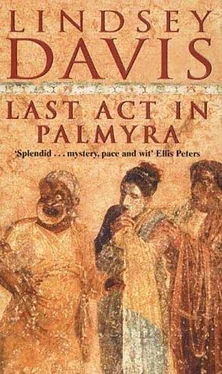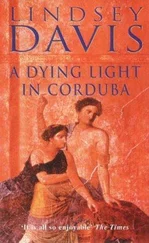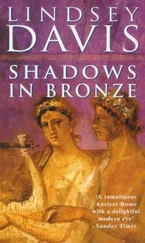Lindsey Davis - Last Act In Palmyra
Здесь есть возможность читать онлайн «Lindsey Davis - Last Act In Palmyra» весь текст электронной книги совершенно бесплатно (целиком полную версию без сокращений). В некоторых случаях можно слушать аудио, скачать через торрент в формате fb2 и присутствует краткое содержание. Жанр: Исторический детектив, на английском языке. Описание произведения, (предисловие) а так же отзывы посетителей доступны на портале библиотеки ЛибКат.
- Название:Last Act In Palmyra
- Автор:
- Жанр:
- Год:неизвестен
- ISBN:нет данных
- Рейтинг книги:5 / 5. Голосов: 1
-
Избранное:Добавить в избранное
- Отзывы:
-
Ваша оценка:
- 100
- 1
- 2
- 3
- 4
- 5
Last Act In Palmyra: краткое содержание, описание и аннотация
Предлагаем к чтению аннотацию, описание, краткое содержание или предисловие (зависит от того, что написал сам автор книги «Last Act In Palmyra»). Если вы не нашли необходимую информацию о книге — напишите в комментариях, мы постараемся отыскать её.
Last Act In Palmyra — читать онлайн бесплатно полную книгу (весь текст) целиком
Ниже представлен текст книги, разбитый по страницам. Система сохранения места последней прочитанной страницы, позволяет с удобством читать онлайн бесплатно книгу «Last Act In Palmyra», без необходимости каждый раз заново искать на чём Вы остановились. Поставьте закладку, и сможете в любой момент перейти на страницу, на которой закончили чтение.
Интервал:
Закладка:
Exhausted, we crept away that night, before Hippos could demand even more excitement from our repertoire.
Chapter XLI
Approaching Dium we were told there was a plague. We retreated very fast.
Chapter XLII
Abila was not officially one of the fabled ten in the region of the Ten Towns. Like other places, this one claimed to belong in order to acquire prestige and the sense of mutual protection against raiders that was enjoyed amongst the true federation. If raiders turned up and asked to see their certificate of membership, presumably the claim failed and they had to submit to pillage meekly.
It did have all the qualifying features of the best of the Decapolis: a beautiful location, a rippling stream, good defensive walls, a Greek acropolis plus a more Romanised settlement, a huge temple complex honouring deities to suit every palate, and a theatre. The local architecture was a rich mixture of marble, basalt and grey granite. Abila was set on a high rolling plateau where a restless wind eerily seethed. There was something remote and lonely about it. The people looked at us thoughtfully; they were not directly hostile but we found the atmosphere unsettling.
Our thwarted trip to Dium, leading to an unexpectedly lengthened journey, had caused us to arrive at an awkward time of day. Normally we travelled through the night to avoid the worst heat, and tried to enter cities in the morning. Then Chremes could investigate the possibilities for a booking at an early stage while we others rested and complained about him among ourselves.
Having come on a poor track, we reached Abila well after noon. No one was happy. One of the waggons had had a broken axle, which held us up on a road that had seemed likely to be patrolled by brigands, and we were all shaken to bits by the roughness of the ground. On arrival we threw up tents, then straight away retired into them without wanting to make plans.
Outside our tent, Musa doggedly lit a fire. However tired we were, he always did this, and also always fetched water, before he would relax. I forced myself to co-operate and fed the ox, having my foot stepped on by the ridiculous beast in return for my act of duty. Helena found food for us, though no one was hungry.
It was too hot, and we were too ill-tempered to sleep. Instead we all sat cross-legged and talked restlessly.
'I feel depressed,' Helena exclaimed. 'We're running out of cities but not solving anything. What are the places we have left to visit? Just Capitolias, Canatha, and Damascus.' She was in a brisk mood again, answering her own questions as if she expected Musa and me to stare into space lethargically. We did that for a while, not deliberately intending to annoy her but because it seemed natural.
'Damascus is big,' I offered eventually. 'There seems a good hope of finding Sophrona.'
'But what if she was at Dium?'
'Then she's probably caught the plague. Thalia wouldn't want her back.'
'Meanwhile we go on searching for her, though, Marcus.' Helena hated wasted effort. I was an informer; I was used to it.
'We have to do something, fruit. We're trapped at the ends of the Empire, and we need to earn our keep. Look, we'll go to the last three cities with the company and if Sophrona doesn't turn up then we'll know we should have tried Dium. If it happens, we can decide what we think about this plague.'
It was one of those moments that hit travellers, a moment when I reckoned our decision would be to take a fast ship home. I didn't say it, because we were both so frustrated and gloomy that even mentioning a retreat would have had us packing our bags that minute. These moods pass. If they don't, then you can suggest going home.
'Maybe there was nothing really wrong at Dium,' Helena fretted. 'We only have the word of a caravan we met. The men who told us may have been lying for some reason. Or it could be no more than one child with spots. People panic too easily.'
I tried myself not to sound panicky. 'Risking our own lives would be stupid – and I'm not going to be responsible for extracting a runaway musician from Dium if taking her to Rome might bring an epidemic there. It's too high a price for a water-organ fugue, however brilliant a player she is.'
'All right.' After a moment Helena added, 'I hate you when you're sensible.'
'The caravanners looked pretty grim when they waved us away,' I insisted.
'I said, all right!'
I saw Musa smile faintly. As usual he was sitting there saying nothing. It was the kind of irritating day when I could easily have lost my temper with him for this silence, so I covered by taking charge: 'Maybe we need to take stock.' If I thought this would perk up my companions, I was disappointed. They both remained listless and glum. Still, I pressed on: 'Looking for Sophrona may be pointless, I agree. I know the girl could be anywhere by now. We're not even certain she ever left Italy.' This was verging on too much pessimism. 'All we can do is to be as thorough as possible. Sometimes these jobs are impossible. Or you may run across a piece of luck and solve the case after all.'
Helena and Musa looked as impressed as a desert vulture who had flown down to an intriguing carcase only to find it was a piece of old tunic blowing against a broken amphora. I try to stay cheerful. However, I gave up on the girl musician. We had been looking for her for too long. She had ceased to seem real. Our interest in the creature had waned, along with any chances we had ever had of finding her out here.
Suddenly Helena rallied. 'So what about the murderer?'
Once again I tried to liven us up with a review of the facts. 'Well what do we know? He's a man, one who can whistle, who must be fairly strong, who wears a hat sometimes -'
'His nerve holds,' contributed Musa. 'He has been with us for weeks. He knows we are looking for him, yet he makes no mistake.'
'Yes, he's confident – although he does jump sometimes. He panicked and tried to put you out of action, Musa, then he soon silenced Ione.'
'He's ruthless,' said Helena. 'And also persuasive: he did make both Heliodorus and Ione agree to go somewhere alone with him. Ione even suspected he was a killer, though I presume that didn't apply in the playwright's case.'
'Let's think about Petra again,' I suggested. 'The chief players went there and came back without the playwright. What have we found out about them? Who hated Heliodorus enough to turn his walk into a swim?'
'Most of them.' Helena ticked them off on her fingers: 'Chremes and Phrygia, because he plagued them about their unhappy marriage and Phrygia's lost baby. Philocrates because they were unsuccessful rivals for Byrria. Byrria, too, because he tried to rape her. Davos partly because of his loyalty to Phrygia, but also because he thought the man was…' She hesitated.
'A shit,' I supplied.
'Worse: a bad writer!' We all grinned briefly, then Helena carried on. 'Congrio loathed Heliodorus because he was bullied, but Congrio is let off because he can't whistle.'
'We'd better check that,' I said.
'I asked Chremes,' she whipped back crisply. 'As for the Twins, they have told us they disliked Heliodorus. But do they have a particular reason? A strong enough motive to kill him?'
I agreed: 'If there was one, we haven't unearthed it yet. They told me that Heliodorus couldn't succeed in doing them down on the stage. If he tried to write poor parts, they could improvise. Well, we know that's true.'
'So they were not in his power,' Helena mused. 'Yet they do say they despised him.'
'Right. And if we come forward in time, one at least -Tranio -has an unsatisfactory alibi for the night Ione died. Everyone else seems to be accounted for that night. Poor Congrio was running around Gerasa writing wrongly spelt playbills. Grumio was joking his heart out in the street. Chremes, Davos and Philocrates were all dining together – '
Читать дальшеИнтервал:
Закладка:
Похожие книги на «Last Act In Palmyra»
Представляем Вашему вниманию похожие книги на «Last Act In Palmyra» списком для выбора. Мы отобрали схожую по названию и смыслу литературу в надежде предоставить читателям больше вариантов отыскать новые, интересные, ещё непрочитанные произведения.
Обсуждение, отзывы о книге «Last Act In Palmyra» и просто собственные мнения читателей. Оставьте ваши комментарии, напишите, что Вы думаете о произведении, его смысле или главных героях. Укажите что конкретно понравилось, а что нет, и почему Вы так считаете.












